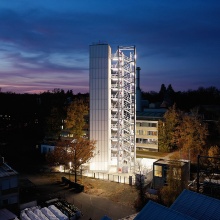Mission statement
As civil and environmental engineers, we shape our environment and therefore bear a special responsibility for our future livelihoods.
Therefore, Faculty 2 Civil and Environmental Engineering is committed to giving priority to climate protection, sustainability and the achievement of the Sustainable Development Goals of the United Nations in its research and teaching. In this way, we aim to support the global transformation towards a sustainable and equitable economy and way of life.
We support the 2030 goals of the United Nations (UN) for sustainable development!
That is, we act in such a way that the needs of the present can be met without depriving future generations of their opportunities for a life without limitations!
Each of us can make his/her contribution. The 2030 Agenda of the United Nations (UN) with its 17 goals helps us to act in the workplace, in research and in teaching in such a way that we can contribute to a global sustainable development on this planet in social, economic and environmental terms.
Focus of our research and teaching:
- Climate and resource-saving construction
- Sustainability in space and transport
- Sustainable infrastructure, supply and disposal
Faculty 2 already represents these focal points in dialog with politics, business, associations and civil society. In addition, the aim is to attract committed students to study as well as students or doctoral candidates for further research activities in this area.
As faculty, we are committed to promoting environmental awareness and sustainable action by our faculty members. Environmental and sustainability aspects are to be considered in all areas of working life. On the way to a sustainable and environmentally conscious faculty, we would like to motivate all employees to make their contribution to sustainable development.
Our guidelines:
- We want to protect the climate.
- We try to save energy and thus avoid climate-relevant emissions.
- We use resources sparingly and in accordance with the idea of recycling.
- We use water sparingly.
- We want to promote biodiversity.
The measures and projects are intended to support the University of Stuttgart on its way to becoming a climate-neutral institution in the state of Baden-Württemberg.
Min Zhang
M. A.Faculty office manager


